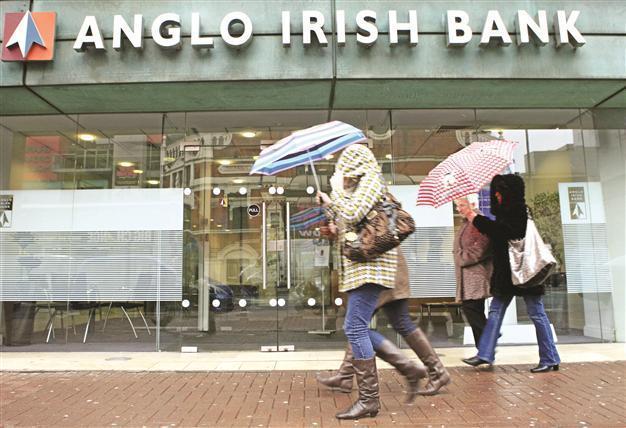Ireland is relieved as ECB agrees on bank debt deal
DUBLIN/FRANKFURT - Reuters

In this file picture taken on people walk past an Anglo Irish Bank branch. The Irish government liquidated the bank on Feb. 6 with a emergency legislation. AFP photo
The European Central Bank agreed a deal yesterday to ease Ireland’s debt burden in a major boost to Dublin’s hopes of emerging from an international bailout programme.“On Ireland, there wasn’t a decision to take, we, the governing council, unanimously took note of the Irish operation... We don’t want to enter into the details of the swap,” he told the bank’s monthly news conference when asked about the plan.
Prime Minister Enda Kenny has staked his administration’s reputation on cutting the cost of bailing out Anglo Irish Bank, now known as Irish Bank Resolution Corp, or IBRC, and the ECB’s governing council in Frankfurt was considering a fresh proposal after rejecting a previous plan last month.
The agreement comes a day after Dublin rushed through emergency laws to liquidate Anglo Irish. In the broader plan, the government was hoping to be allowed to pay off the debts of state-owned Anglo over a longer period, easing public finances.
That means it would avoid having to pay a politically toxic 3.1 billion euros a year until 2023 to service the note it issued to underwrite failed Anglo during a meltdown of the main Irish lenders after a real estate bubble burst in 2008.
Anglo Irish was brought down by a real estate crash after a bubble inflated by cheap credit. Fearful of knock-on effects, the Irish state stepped in, landing itself with a huge debts that forced it into austerity budgets as the economy shrank and obliged it to accept a conditional bailout from the EU and IMF.
Technical negotiations between the ECB and Irish officials have dragged on for 18 months, with the central bank conscious that any deal given to Dublin to ease the crunch in debt repayments could set a precedent for other countries, such as Spain, which are also dealing with large bank debts.However, European leaders also needed a success story to emerge from the region’s debt crisis. Ireland would issue longer-terms bonds in place of the notes.
Under the plan put to the ECB, the 28 billion euros in promissory notes will be replaced with long-term government bonds, meaning that Ireland can make more gradual repayments, a source familiar with the discussions told Reuters.
















